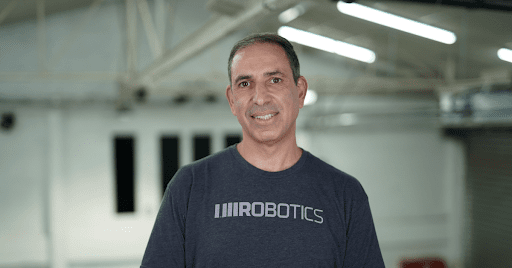Automation and robotics have been making waves in disrupting a multitude of industries on a global scale.
The fulfillment sector, in particular, has seen a massive boost in productivity and efficiency with its last-mile facilities with the help of robotics. As more leaders witness the insurmountable benefits of these technologies, they now scour for the most cutting-edge solutions to modernize their warehouses and facilities.
We had the opportunity to interview Eyal Yair, co-founder and CEO of 1MRobotics, an Israel-based startup that makes rapid last-mile fulfillment profitable at hyper-scale. Eyal explains the industry gaps he and his team of seasoned experts noticed that led to the company's inception and gives a closer look at their state-of-the-art nano-fulfillment solutions.
You co-founded 1MRobotics in 2021 to make rapid last-mile fulfillment profitable at hyper scale. What were the industry gaps that you’ve noticed that led to the foundation of the company?
1MRobotics develops robotic nano-fulfillment centers designed specifically to meet the ever-growing need for rapid delivery and enable quick expansion and optimal unit economics.
Today, nearly all existing last-mile facilities operate manually and inefficiently. This is where 1MRobotics comes in, providing a "plug-and-play" full automation solution for last-mile fulfillment across nearly any category while reducing costs and associated environmental impact.
Our systems are shipped globally inside standard shipping containers and are ready to operate upon delivery. On-site, the systems are deployable either as standalone units within the containers or inside any retail facility, allowing 1MRobotics the flexibility to position its units anywhere around the world. 1MRobotics brings full automation and a modular approach, enabling rapid deployment at a global scale while ensuring a significant reduction in operational costs.
How did the pandemic play a role in the inception of 1MRobotics?
As we enter the post-COVID era, we are witnessing a new generation of consumers who demand fast delivery, which you may have experienced yourself. The truth is that people are willing to pay more for instant delivery. To offer this, businesses must have physical proximity to their customers. Many models have attempted to solve this issue, but most have failed due to the high costs of real estate and personnel.
As we enter the post-COVID era, we are witnessing a new generation of consumers who demand fast delivery, which you may have experienced yourself.
Your team is composed of seasoned entrepreneurs and experts who have worked at organisations such as Magic Leap, Elbit Systems, Allot Communications, Bringg, and more. Can you share with us your story on what brought you together to ignite the idea behind 1MRobotics?
Several years ago, I consulted for a logistics company. The job involved visiting companies that manufacture automation for large warehouses, and I immediately fell in love with the field. During these visits, I realized that the future of eCommerce lies in logistics capabilities that the market was not yet able to provide. There was no doubt that this would be the next big thing in the market, so I decided to take it to the next level.
During my investigation, a mutual friend connected me with my co-founder, Roee Tuval, and together we discovered that the field of large robotic warehouses in the micro-fulfillment area, and even larger than that, was saturated with solutions. At the same time, the world of nano-fulfillment warehouses for fast shipping was starting to grow, and we realised that this world wouldn't survive without automation. This was our "Aha!" moment where we realised we were onto a huge opportunity. 1MRobotics was born out of this vision.
With that in place, we began building our team, recruiting IDF veterans we had previously worked with. The knowledge and experience they brought to the project allowed us to develop a working product in less than a year, an extremely impressive achievement in our industry.
How does 1MRobotics’ hyperlocal automated solution differ from traditional automation systems, and what advantages does it offer to businesses?
Other solutions on the market are designed for very large facilities. It takes several months to build and obviously a lot of money. They are also only capable of providing a limited delivery time, typically not exceeding the same day.
Our automated off-the-shelf, "plug & play" solutions support true omnichannel fulfillment (direct-to-consumer delivery, click & collect, returns, etc.) while enabling 24/7 operations in hyperlocal proximity. This means that customers gain access to fulfillment services that are readily available whenever and wherever they need it. This is a product, not a project. Within a few hours, you can deploy it and begin working.
By reducing headcount, real estate, electricity and transportation costs, and automating operations, including picking & packing, we allow brands to deliver in less than 2 hours at any scale and also be more environmentally friendly.
Walk us through Genesis and Flexsis. How do they work?
Currently, we offer two types of solutions: a fully automated one called Genesis and a collaborative automation called Flexsis.
Genesis is a lights-out facility that brings end-to-end automation to more sectors with zero headcount and an autonomous picking and packing process. It is suitable for retail, CPGs, consumer electronics, beverages, and generally any product line that has similar dimensions and shapes.
There was no doubt that this would be the next big thing in the market, so I decided to take it to the next level.
Flexsis is designed to meet the unique needs of businesses with deeper and more diversified product assortments. It is suitable for a range of industries, from quick commerce and convenience stores to manufacturing lines, distribution centers, and warehouses for picking and packaging. With Flexsis, businesses can reduce headcount to a bare minimum and streamline operations.
MRobotics’ goal is to bring lights-out automation to more industries and sectors. What industries do you see as being the most promising for the implementation of your robotic solution, and why?
In addition to the industries I mentioned, we can see today that other sectors also need certain inventory "right here and right now." For example, auto parts assembly lines and manufacturing industries have a constant need for various parts.
Our innovation brings the possibility of on-demand delivery to these industries in a way that benefits both businesses and the people they serve: the customer/employee gets what they want/need very quickly, and the business becomes more efficient and profitable. It all starts with our hyperlocal infrastructure. As our systems continue to develop, what is considered a high standard today will become the norm.
What are some of the biggest challenges facing the robotics industry today, and how is 1MRobotics addressing these challenges?
Development time: In the robotics industry the development of a product can certainly take several years. As I've already mentioned, in the case of 1MRobotics, thanks to our professional team we were able to develop in less than a year, from scratch, a product that works and is commercially available on the market.
Production costs: Industrial robotics products are very expensive, and they can be extremely problematic for businesses. We bring full automation and a modular approach while offering our clients a flexible Opex-based commercial model, enabling rapid deployment at a global scale, while ensuring a significant operational cost reduction and business growth.
Smarter robotics: Today, robotics in the world is very advanced, but no robotic arm is delicate enough to be able to grasp frozen meat and immediately afterwards a banana, for the simple reason that it will smash it. The robotic arm needs to be taught to differentiate between coarse and fine products and be able to collect both without difficulty, which is one of the developments we're working on very hard. Within year and a half, we hope to reach a level of precision that will allow us to enter a new era of robotics to the industry.
Do you think there will come a time when warehouses and fulfillment centers will be 100% operated by robots?
Yes, 100%. This is the direction the market is heading in.
It is already happening in the robotic store we set up with a major global DTC brand in Tel Aviv. We will be establishing fulfillment warehouses with customers from different industries worldwide in 2023, including consumer electronics, beverages, and convenience stores.
As we continue to develop, I believe there is no reason for brands to rely on manual processes when our automation is so accessible to them, both in terms of operational efficiency and in terms of payment model.














